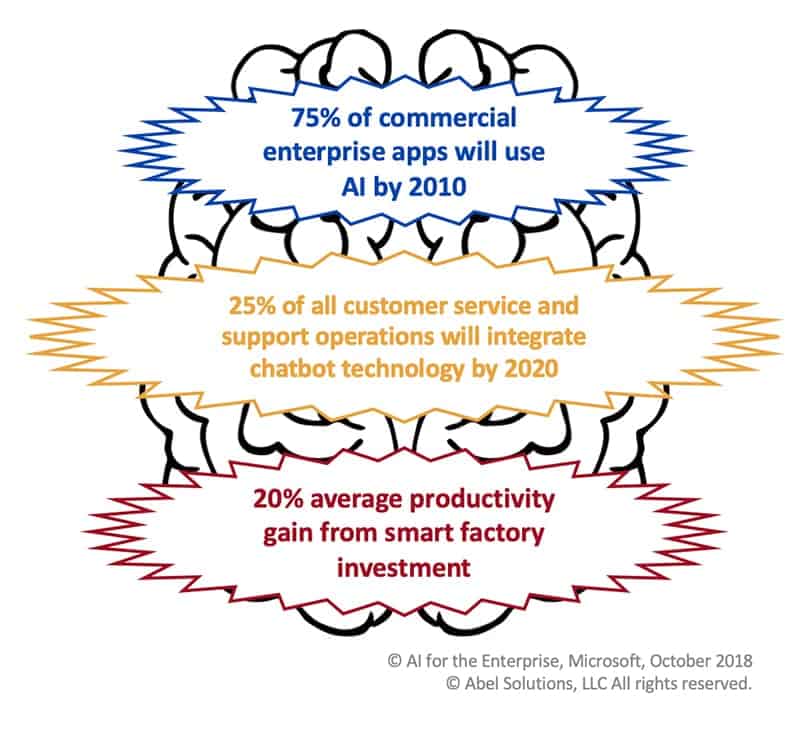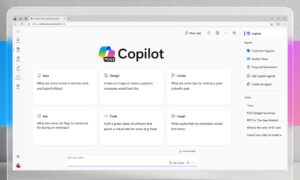[vc_row][vc_column][vc_column_text]More than Sci-Fi
Undoubtedly, you’ve heard the buzz about Artificial Intelligence for some time now. You’ve seen photos of self-driving cars, you’ve chatted with Cortana, Siri, and Alexa. But perhaps “real” AI still feels impending, like tomorrow’s weather forecast that keeps getting postponed. Hype and publicity centered on a broad concept can leave you with that impression. However, are you aware that leading organizations around the globe are already differentiating themselves by integrating AI into their business processes and applications? Are you aware of what AI can do for your organization today?
AI has been somewhat abused as a term. At Abel Solutions, when we talk about today’s AI capabilities, we are referring to holistic solutions that 1) leverage machine learning techniques on a dataset and 2) from those insights, take appropriate action.
According to Forbes, “Companies embracing analytics and AI have significantly more growth than those who lag in adoption. Almost all companies identified as AI Leaders … experienced more than 10% growth in the past year (81%), compared with 36% of laggards. And just over half (51%) of AI Leaders realized more than 20% growth, something only 13% of laggards accomplished.” (Forbes Insights, “Human AI is Here,” 2019)
What can AI Do for You?
The opportunity to apply AI is not siloed to a particular industry. Organizations of all sizes are utilizing AI to increase efficiency and stay ahead of the competition by infusing existing applications with machine learning to predict future outcomes, mining existing data to produce new insights and recommendations, and creating intelligent solutions to automate manual processes.
“Any organization in any industry, especially those with very large amounts of data, can use AI for business Value.”
Gartner, 2018
Many of the most widely applicable use cases are already ubiquitous:
- Leverage intelligent chat bots to handle customer support inquires, create personalized customer interactions, or provide internal IT help desk services.
- Dynamically predict maintenance, staffing, credit risk, or inventory needs based on historical data.
- Automatically classify your organization’s documents and images.
- Provide real-time visual, chat, and voice interactions with manufacturing device analytics.
- Provide personalized patient advice to help manage client health.
- Dynamically price your online store inventory based on fluctuating real-time factors such as fulfillment.
Because of the cloud-first service model surrounding AI, these outcomes are not reliant on large capital expenditure on infrastructure. It’s easier than ever to get started. The question for business executives is no longer whetherto embrace the capabilities of AI, but how.
Key Strategic Questions for Business
Often, business leaders have no trouble identifying an opportunity for AI somewhere in their operations. Instead, the challenge comes in developing a holistic, long-term strategy. If you are a leader or manager, it’s important to consider these questions when implementing AI:
- Does your organization have a defined vision statement for AI?
- Has your organization conducted a formal assessment of the opportunities AI might afford it?
- Does your organization store historical data that could be leveraged to generate actionable predictions?
- What level of AI maturity has your organization achieved at present?
- Has your organization identified resources or a partner to help achieve the next level of AI maturity?
If you or your leadership feel unequipped to answer these questions or are simply in need of an AI partner, engage with Abel Solutions today and bring transformation to your business.
This Abel Insight written by Abel Solutions’ Dan Morton, Manager Consulting Services.[/vc_column_text][/vc_column][/vc_row]






